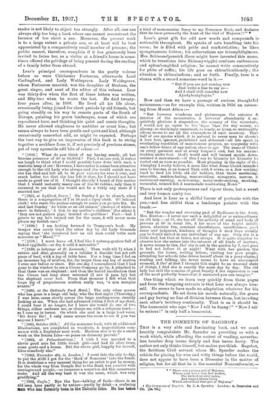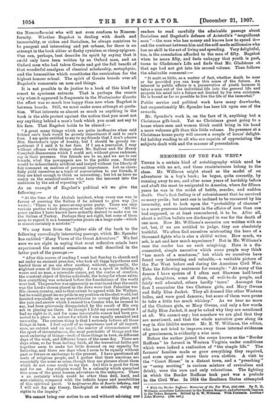THE COMMENTS OF BAGSHOT.t
THIS is a very able and fascinating hook, and we must heartily congratulate Mr. Spender on providing us with a work which, while affording the easiest of reading, neverthe- less touches deep issues deeply and fine issues finely. The author not only thinks himself, but makes you think. Bagshot, the fictitious Civil servant whom Mr. Spender makes the vehicle for placing his wise and witty things before the world, does not appear to have been a Dissenter in the matter of religion, but for all that he is the essential Nonconformist,—
• " There was a young girl of Majorca, Whose aunt was a very fast walker, She walked seventy miles, And leaped fifteen stiles, Which astonished that girl of Majorca."
t The Comments of Bagshot. By J. A. Spender. London: A. Co:eatable and co, Ph (43 the Nonconformist who will not even conform to Noncon- formity. Whether Bagshot is dealing with death and immortality, or riches and Socialism, be always contrives to be pungent and interesting and yet urbane, for there is no attempt in the book either at flashy cynicism or cheap epigram. One can, perhaps, best describe its spirit by saying that it could only have been written by an Oxford man, and an Oxford man who had taken Greats and got the full benefit of that wonderful amalgam of classical scholarship, metaphysic, and the humanities which constitutes the curriculum for the highest honour school. The spirit of Greats broods over all Bagshot's comments on men and things.
It is not possible to do justice to a book of this kind by resort to specimen extracts. That is perhaps the reason why when it appeared in fragments in the Westminster Gazette the effect was so much less happy than now when Bagshot is between boards. Still, we must make some attempt at quota- tion. What interests us almost as much as anything in the book is the able protest against the notion that you must not say anything behind a man's back which you must not say to his face. That Bagshot holds to be absurd:- " A great many things which are quite inoffensive when said behind one's back would be grossly impertinent if said to one's face. I am quite entitled to say to my friends that I don't admire Mrs. Hawksbeo's type of beauty, but I should be grossly im- pertinent if I said it to her face. If I am a journalist, I may without offence write things about Mr. Balfour and Sir Henry Campbell-Bannerman which I could not, without gross rudeness, say in their presence. Our friends are to us, and we are to our friends, what the newspapers are to the public man. Society would be indescribably artificial and insipid without the liberty of fair comment on matters of personal importance. Let us cheer- fully yield ourselves as a topic of conversation to our friends, if they are kind enough to think us interesting ; but let us have no mercy on the mischief-makers who turn the innocent into the malicious by the act of repeating it."
As an example of Bagshot's political wit we give the following :— " At the time of the Akabah incident, when every one was in favour of coercing the Sultan if he refused to give way [ho wrote] : There is no peace-at-any-price party. There are only various parties which disapprove of each other's wars.' 'All the peace parties I have known have ardently desired to make war on the Sultan of Turkey. Perhaps they are right, but some of them seem to regard it as a humanitarian picnic on a large scale—which is almost certainly a mistake.'" We may turn from the lighter side of the book to the following exceedingly interesting passage, which Mr. Spender has entitled "Many Views of the Great Adventure." We feel sure we are right in saying that most reflective minds have experienced the mental sensations so well described in the latter part of the passage :— " After this course of reading I went last Sunday to church and sat under an eminent preacher, who took all thIse hypotheses and hurled them at me one after another, without, apparently, the slightest sense of their incongruity. I was a speck in infinity, a worm and no man, a miserable sinner, yet the centre of creation, the constant object of Divine solicitude, the being for whose salva- tion everything was ordained before the foundations of the world were laid. The preacher was apparently as convinced that the earth was the Lord's chosen planet as the Jews were that Palestine was His chosen country, and to that extent he agreed with Dr. Wallace, but he would grant me no pride in my position on the elect world, but insisted repeatedly on my unworthiness to occupy this place, and the pain and sorrow which I caused to a Creator who, he seemed to say, had been grievously disappointed by the result of His own act in placing me there. So though I held my central position I had no right to it, and for some inscrutable reason had been pro- moted to a place in nature for which I was equally unsuited and unworthy. The curious thing is that I seriously believe all these things in turn. I feel myself of no importance and of all import- ance, an outcast and an angel, the master of circumstances and the sport of circumstances, the most perishable of things and the most enduring of things—each of those things in turn, on different days of the week, and different hours of the same day. There are days when, so far from lacking faith, all the terrestrial faiths put together seem to make too little demand on my capacity for believing, and there are days when I seem to be equally without past or future or anchorage to the present. I have questioned all sorts of religious people, and I gather that their emotions are essentially the same as mine, though they use phrases about them which do not come easily to my lips. And this is good for them and for me. Any religion would be a calamity which quenched this sense of the great human adventure in the unknown. There s no certainty which could be other than dull, hard, and materialistic, compared with the infinite hopes and possibilities of this spiritual quest. '0 ttretkacrros fifes fhorrbs ®al), and I will not for any theory, theological or scientific, resign ray rights in the inquiry."
We cannot bring our notice to an end without advising our
readers to read carefully the admirable passage about Socialism and Bagshot's defence of Aristotle's "magnificent man "—the man who has money and knows how to spend it and the contrast between him and the self-made millionaire who has no skill in the art of living and spending. Very delightful, too, is the consolation afforded to the man of fifty. Bagshot when he nears fifty, and feels unhappy that youth is past, turns to Gladstone's Life and finds that Mr. Gladstone at that age had not got into his second volume. Then follows the admirable comment :—
" It matters little, as a matter of fact, whether death be near or far provided you can keep this sense of the future. An interest in public affairs is a preservative of youth because it takes a man out of the individual life into the general life and projects his mind into a future not limited by his own existence. He is bound as far as possible to live the life of the immortal."
Public service and political work have many drawbacks, but unquestionably Mr. Spender has here hit upon one of the rewards.
Mr. Spender's work is, on the face of it, anything but a Christmas gift-book. Yet no Christmas guest going to a house where men and women think could bring in his hand a more welcome gift than this little volume. Its presence at a Christmas house-party will ensure a couple of hours' delight- ful holiday reading to all who are capable of appreciating the subjects dealt with and the manner of presentation.















































 Previous page
Previous page